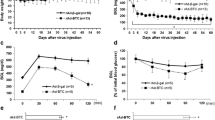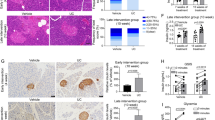Abstract
Objective
To investigate the effects of anti-CD20 monoclonal antibody (mAb) combined with IL-10 mediated by adenovirus on the regeneration of pancreatic β cells in nonobese diabetic (NOD) mice.
Methods
Serum IL-10, TGF-β, TNF-α, IFN-γ, C-peptide, and insulin were determined using commercial ELISA. Western blot assay and real-time PCR were performed to determine the expression of mRNA and protein expression, respectively. Besides, immunohistochemistry and immunofluorescence were performed.
Results
Immunohistochemisty assay indicated Ngn3 expression showed decrease in the anti-CD20+IL-10 group compared with the other groups (p < 0.05). Immunofluorescence assay showed Pdx-1 and insulin coexpressing cells showed increase in the anti-CD20+IL-10 group. Real-time PCR indicated that the expression of Pdx-1, Pax4, Nkx6.1, and Mafa mRNA showed significant increase in the anti-CD20+IL-10 group compared with the other groups (p < 0.05). The expression of Pdx-1, Pax4, Nkx6.1, and Mafa protein was significantly upregulated in the anti-CD20+IL-10 group compared with that of the other groups (p < 0.05).
Conclusions
Anti-CD20 combined with IL-10 promoted insulin secretion in NOD mice and the controlling of blood glucose. Besides, the combination induced the decrease of TNF-α and IFN-γ, and the elevation of TGF-β. Besides, it may activate the Pdx-1-Ngn3-Pax4-Nkx2.2-Nkx6.1 signaling pathway, and trigger the regeneration of pancreatic β cells.



Similar content being viewed by others
References
Dor Y, Brown J, Martinez OI, Melton DA. Adult pancreatic beta-cells are formed by self-duplication rather than stem-cell differentiation. Nature. 2004;429(6987):41–6.
Vaseghi H, Jadali Z. Th1/Th2 cytokines in type 1 diabetes: relation to duration of disease and gender. Indian J Endocrinol Metab. 2016;20(3):312–6.
Kahaly GJ, Hansen MP. Type 1 diabetes associated autoimmunity. Autoimmun Rev. 2016;15:644–8.
Morran MP, Vonberg A, Khadra A, Pietropaolo M. Immunogenetics of type 1 diabetes mellitus. Mol Asp Med. 2015;42:42–60.
Xu AJ, Zhu W, Tian F, Yan LH, Li T. Recombinant adenoviral expression of IL-10 protects beta cell from impairment induced by pro-inflammatory cytokine. Mol Cell Biochem. 2010;344(1–2):163–71. https://doi.org/10.1007/s11010-010-0539-x.
Pescovitz MD, Greenbaum CJ, Bundy B, Becker DJ, Gitelman SE, Goland R, et al. B-lymphocyte depletion with rituximab and beta-cell function: two-year results[J]. Diabetes Care. 2014;37(2):453–9. https://doi.org/10.2337/dc13-0626.
Falcone M, Lee J, Patstone G, Yeung B, Sarvetnick N. B lymphocytes are crucial antigen-presenting cells in the pathogenic autoimmune response to GAD65 antigen in nonobese diabetic mice. J Immunol. 1998;161(3):1163–8.
Liu CL, Ye P, Lin J, Butts CL, Miao CH. Anti-CD20 as the B-cell targeting agent in a combined therapy to modulate anti-factor VIII immune responses in hemophilia a inhibitor mice. Front Immunol. 2014;4:502.
Oling V, Reijonen H, Simell O, Knip M, Ilonen J. Autoantigen-specific memory CD4+ T cells are prevalent early in progression to type 1 diabetes. Cell Immunol. 2012;273(2):133–9. https://doi.org/10.1016/j.cellimm.2011.12.008.
Burrack AL, Tijana M, Fife BT. T cell-mediated Beta cell destruction: autoimmunity and alloimmunity in the context of type 1 diabetes. Front Endocrinol. 2017;8.
Uchida J, Hamaguchi Y, Oliver JA, Ravetch JV, Poe JC, Haas KM, et al. The innate mononuclear phagocyte network depletes B lymphocytes through fc receptor–dependent mechanisms during anti-CD20 antibody immunotherapy. J Exp Med. 2004;199(12):1659–69.
Hu C, Rodriguezpinto D, Du W, et al. Treatment with CD20-specific antibody prevents and reverses autoimmune diabetes in mice. J Clin Investig. 2007;117(12):3857–67.
Qiao YC, Shen J, Hong XZ, Liang L, Bo CS, Sui Y, et al. Changes of regulatory T cells, transforming growth factor-beta and interleukin-10 in patients with type 1 diabetes mellitus: a systematic review and meta-analysis. Clin Immunol (Orlando, Fla). 2016;170:61–9. https://doi.org/10.1016/j.clim.2016.08.004.
Yang XO, Nurieva R, Martinez GJ, Kang HS, Chung Y, Pappu BP, et al. Molecular antagonism and plasticity of regulatory and inflammatory T cell programs. Immunity. 2008;29(1):44–56. https://doi.org/10.1016/j.immuni.2008.05.007.
Mosser DM, Zhang X. Interleukin-10: new perspectives on an old cytokine. Immunol Rev. 2008;226:205–18. https://doi.org/10.1111/j.1600-065X.2008.00706.x.
Desgraz R, Bonal C, Herrera PL. Beta-cell regeneration: the pancreatic intrinsic faculty. Trends Endocrinol Metab. 2011;22(1):34–43. https://doi.org/10.1016/j.tem.2010.09.004.
Wang X, Sterr M, Burtscher I, et al. Genome-wide analysis of PDX1 target genes in human pancreatic progenitors. Mol Metab. 2018;S2212877817309444.
Horiguchi M, Yoshida M, Hirata K, Furuyama K, Masui T, Uemoto S, et al. Senescence caused by inactivation of the homeodomain transcription factor Pdx1 in adult pancreatic acinar cells in mice. FEBS Lett. 2019;593:2226–34.
Jensen J, Heller RS, Funder-Nielsen T, Pedersen EE, Lindsell C, Weinmaster G, et al. Independent development of pancreatic alpha- and beta-cells from neurogenin3-expressing precursors: a role for the notch pathway in repression of premature differentiation. Diabetes. 2000;49(2):163–76.
Watada H, Scheel DW, Leung J, German MS. Distinct gene expression programs function in progenitor and mature islet cells. J Biol Chem. 2003;278(19):17130–40. https://doi.org/10.1074/jbc.M213196200.
Sander M, Sussel L, Conners J, Scheel D, Kalamaras J, Dela Cruz F, et al. Homeobox gene Nkx6.1 lies downstream of Nkx2.2 in the major pathway of beta-cell formation in the pancreas. Development (Cambridge, England). 2000;127(24):5533–40.
Churchill AJ, Gutiérrez GD, Singer RA, et al. Genetic evidence that Nkx2.2 acts primarily downstream of Neurog3 in pancreatic endocrine lineage development. eLife. 2017;2017(6).
Zhu Y, Liu Q, Zhou Z, Ikeda Y. PDX1, Neurogenin-3, and MAFA: critical transcription regulators for beta cell development and regeneration. Stem Cell Res Ther. 2017;8(1):240. https://doi.org/10.1186/s13287-017-0694-z.
Wang J, Elghazi L, Parker SE, Kizilocak H, Asano M, Sussel L, et al. The concerted activities of PAX4 and Nkx2.2 are essential to initiate pancreatic β-cell differentiation. Dev Biol. 2004;266(1):178–89.
Matsuoka TA, Kawashima S, Miyatsuka T, et al. Mafa enables Pdx1 to effectively convert pancreatic islet progenitors and committed islet α-cells into β-cells in vivo. Diabetes. 2017;1293.
Author information
Authors and Affiliations
Contributions
TF drafted the article or revised it critically for important intellectual content; LT finally approved the version to be published; LC, ZY, JJ, CZH, and ZLJ contributed to the conception and design or acquisition of data or analysis and interpretation of data.
Corresponding author
Ethics declarations
Conflict of interest
The authors declare that they have no conflict of interest.
Ethical approval
All applicable international, national, and/or institutional guidelines for the care and use of animals were followed.
Ethical considerations
The study protocols were approved by the EC of Qingdao Women and Children Hospital.
Additional information
Publisher’s note
Springer Nature remains neutral with regard to jurisdictional claims in published maps and institutional affiliations.
Rights and permissions
About this article
Cite this article
Tian, F., Li, C., Zhang, Y. et al. Effects of anti-CD20 monoclonal antibody and IL-10 on pancreatic β cell regeneration in nonobese diabetic mice. Int J Diabetes Dev Ctries 41, 593–599 (2021). https://doi.org/10.1007/s13410-020-00899-0
Received:
Accepted:
Published:
Issue Date:
DOI: https://doi.org/10.1007/s13410-020-00899-0




